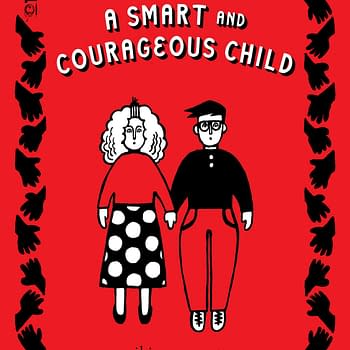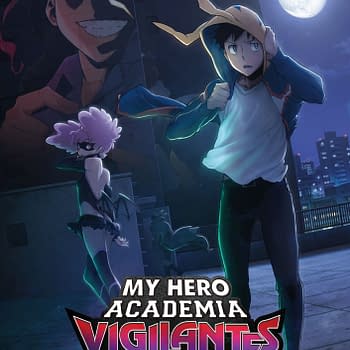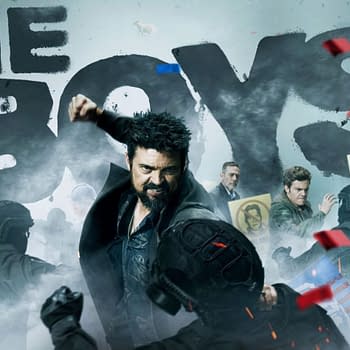Posted in: Opinion, Review, SYFY, TV, TV | Tagged: alan tudyk, bleeding cool, cable, comic books, Comics, dark horse, opinion, Peter Hogan, preview, Resident Alien, Review, science fiction, steve parkhouse, streaming, syfy, television, tv
Resident Alien: How Not to Be Anything Like the Comics Whatsoever
Resident Alien is an adaptation of a comic book that deliberately makes the opposite creative choice the comic made at every turn. It's an interesting reveal of how Hollywood and the TV business works. To wit: Resident Alien is about an alien hiding in a small town who gets pulled into becoming the town's doctor to solve crimes. "XXXX solves crimes" is the default pitch for the vast majority of TV show pitches in Hollywood. It's a perfect story generator. Protagonists who are called out to solve a crime get a limitless well of plot for the writers to draw from. It's also genre comfort food for business and audience alike. It helps that the original comic has the same premise. It was perhaps inevitable that TV would come calling.
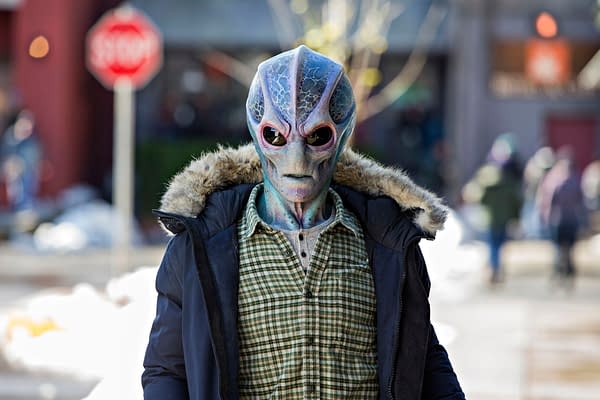
And then the TV show makes the exact opposite of every creative choice the comic made. Where the comic is gentle and low-key, the show goes for histrionics and obvious conflict, and cheap jokes at every turn. Where the comic is subtle, the show is crass.
Resident Alien: The Main Character is Completely Different from the Comic
Was it really necessary to start off by making the hero a killer? The alien murders a doctor who looks like Alan Tudyk and takes his appearance. It seems in these post-Dexter times, TV writers think it's okay to ask the audience to identify with a main character who murders an innocent man right off the bat for no good reason. And his mission on Earth is to kill all humans. The writers grafted the alien from the Destroy All Humans! Video game into the show.
The Harry in the comic is a totally ordinary person despite his outsider status as an alien. The reader never sees what his human face looks like, only his true appearance. That's to offset his utter ordinariness: he's a kind, fundamentally decent man who cares for his community despite his true appearance. His behavior is self-effacing and low-key as he investigates mysteries partly out of curiosity and his love of murder mysteries, partly out of a sense of duty. He's a metaphor for the immigrant in America trying to make his way without getting persecuted or judged. In the TV show, his weirdo behavior would only be tolerated in a TV show. Your tolerance for this show depends on how much you like to watch Alan Tudyk ham and gurn like a malevolent Mork from Ork on meth.
The Supporting Cast is Younger, Prettier, and Unconvincing
The Resident Alien comic works because the townsfolk feel like regular people. The TV show feels the need to make everyone prettier and self-consciously quirky. Both the Mayor and Sheriff in the comics were lived-in, middle-aged men. The TV show has to make them younger and more handsome. Sheriff Mike has to be a weirdly cartoonish younger and a more strapping black man in a portrayal that's highly questionable. The mayor is also younger and more cartoonishly insecure. They're both played by actors who look too much like glamourous Hollywood actors rather than people who live in a small town. Harry's nurse and crime-fighting partner Asta Twelvetrees is given a more clichéd troubled youth and clichéd abusive ex. There are also new characters not in the comic, like the female bartender who doesn't stop talking about how hot she is for Harry. Everybody in the show acts like a TV trope rather than a recognizable human being. Not the actors' fault. It's how they were directed and the scripts they were given.
The Kid in the Show is a More Obvious Trope
In both comic and show, Harry meets a local child who can see his true face. In the comic, it's a 5-year-old girl named Honey, the daughter of one of his patients, who likes him and gives him a drawing of his true face. Harry is nervous that she might expose him but leaves her alone because he means her no harm. In the show, the kid is middle-grade and the son of mayor Ben who screams at the sight of Harry. Harry, in a drunken impulse, tries to murder him. Because the show's writers think it's funny for the hero to be a would-be child killer. A kid who knows there's a deadly alien in town that no one believes is ripped straight out of Invader Zim. It's also a very obvious Screenwriting 101 way to generate dramatic conflict. Just about every element in the show feels derived from dozens of other shows. That's the problem here: we've seen all these tropes dozens of times before in other shows. It all feels very SYFY Channel and not in a good way.
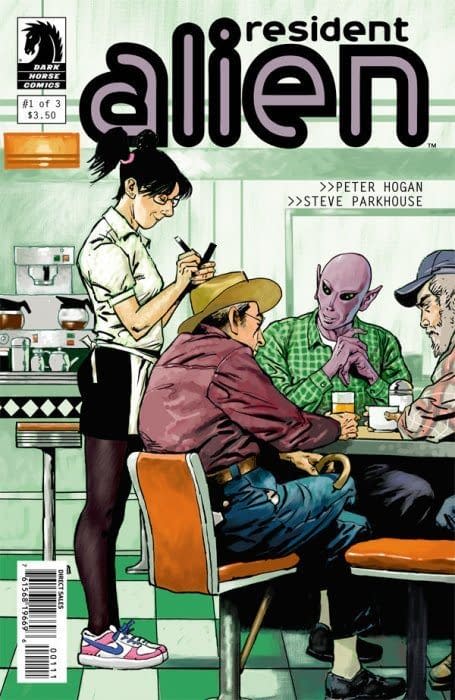
Resident Alien: What About the Comic?
British creators Peter Hogan and Steve Parkhouse are friends and contemporaries of Alan Moore, going back all the way to the early 1980s when they all created stories for the legendary comic anthology Warrior, the birthplace of Moore's Marvelman and V for Vendetta. To read Resident Alien is to be in the hands of consummate comics masters. It's not a flashy series but utter assured and confident in its presentation. It's a gentle, low-key meditation on life, community, and belonging. The TV show sledgehammers all of its plot points and themes. It is a mess of different tones and jokes because the makers don't have confidence in the source material. The showrunner claims to be a fan of the comics but does the opposite in his scripts because the end result is what the producers, the network notes, and his writers' room decided were what would get the show made. You can't really blame them for that insecurity. Shows and movies are expensive and it's a miracle any get greenlit and make it to the air at all. There's no need to complain about the show "ruining" the comics. That's not true – the comics are still around, uncompromised and unsullied for everyone to read. Let's hope at least Hogan and Parkhouse got a nice cheque out of it.



